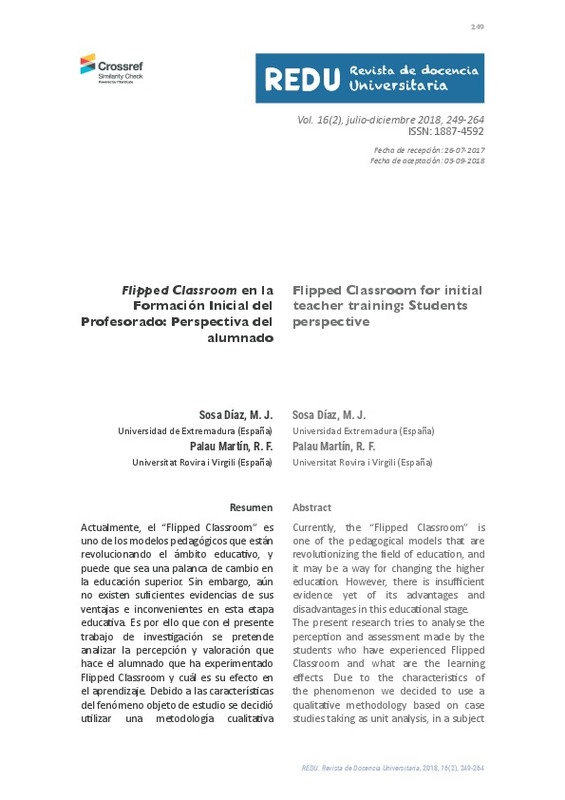|
Resumen:
|
[EN] Currently, the “Flipped Classroom” is one of the pedagogical models that are revolutionizing the field of education, and it may be a way for changing the higher education. However, there is insufficient evidence yet ...[+]
[EN] Currently, the “Flipped Classroom” is one of the pedagogical models that are revolutionizing the field of education, and it may be a way for changing the higher education. However, there is insufficient evidence yet of its advantages and disadvantages in this educational stage. The present research tries to analyse the perception and assessment made by the students who have experienced Flipped Classroom and what are the learning effects. Due to the characteristics of the phenomenon we decided to use a qualitative methodology based on case studies taking as unit analysis, in a subject of a Degree Primary Teacher Training. As data collection instrument was chosen based on questions directed interviews with open-ended responses. The results show that there is no agreement on the students regarding the Flipped Classroom. On the one hand, students are positive about the method and value the educational possibilities that make practical activities in the classroom, and work collaboratively. And secondly, they are a group of very critical students with the model and prefer to continue using a traditional methodology, mainly due to lack of habit of using active methodologies and establish the commitment to learning that these require. The main proposals for improving the methodological design,essentially, are the result mainly about the habits of use it.
[-]
[ES] Actualmente, el “Flipped Classroom” es uno de los modelos pedagógicos que están revolucionando el ámbito educativo, y puede que sea una palanca de cambio en la educación superior. Sin embargo, aún no existen suficientes ...[+]
[ES] Actualmente, el “Flipped Classroom” es uno de los modelos pedagógicos que están revolucionando el ámbito educativo, y puede que sea una palanca de cambio en la educación superior. Sin embargo, aún no existen suficientes evidencias de sus ventajas e inconvenientes en esta etapa educativa. Es por ello que con el presente trabajo de investigación se pretende analizar la percepción y valoración que hace el alumnado que ha experimentado Flipped Classroom y cuál es su efecto en el aprendizaje. Debido a las características del fenómeno objeto de estudio se decidió utilizar una metodología cualitativa basada en Estudios de Casos tomando como unidad de análisis una materia de la titulación de grado en Educación infantil y primaria. Como instrumento de recogida de información se optó por entrevistas dirigida basada en preguntas con respuestas abiertas.
Los resultados evidencian que no hay un acuerdo en el alumnado respecto al Flipped Classroom. Por un lado, se encuentran estudiantes que valoran positivamente el modelo y que valoran las posibilidades educativas que tiene realizar las actividades prácticas en el aula, y trabajar de forma colaborativa. Y por otro, están un grupo de estudiantes muy críticos con el modelo y que prefieren seguir utilizando una metodología tradicional, debido principalmente a la falta de costumbre de utilizar metodologías activas y establecer el compromiso de aprendizaje que estas exigen. Las principales propuestas de mejora del diseño metodológico, esencialmente, son fruto principalmente de esta circunstancia.
[-]
|








